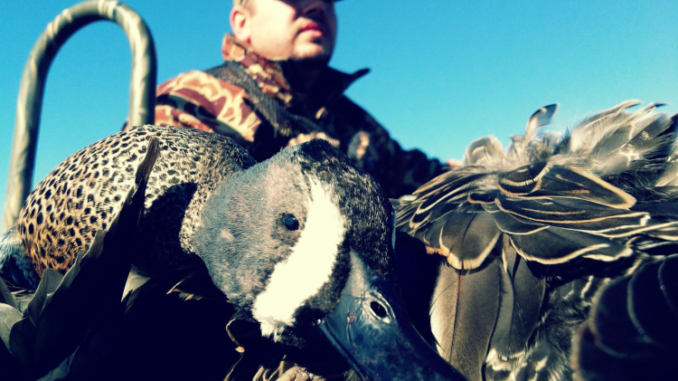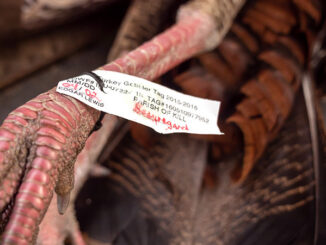
Using surface drive motors responsibly, allowing birds to rest is key, guides say
With Louisiana’s coastal and west zones set to crank up this Saturday morning, duck hunters across the state will be prepping all week in advance of opening day.
Shotguns have to be cleaned and ready, decoys get repaired and bagged up and final blind preparations have to be completed. Licenses and duck stamps need to be squared away, and with any luck, 30 minutes before official sunrise Saturday morning hunters will be greeted by lots of birds and easy limits.
But what if flock after flock flies by out of range, or tons of birds keep pouring into a nearby pond?
If you’re a mobile hunter on public land — especially with access to a surface drive motor —you can scout for birds pretty much anywhere all day long until you find them.
But critics of surface drive motors — which can enter even the most remote ponds with little or no water access — say that practice pressures birds and makes them leave an area sooner than they ordinarily would.
This year on Pass-a-Loutre Wildlife Management Area, mud boats and air-cooled propulsion engines are prohibited after 2 p.m. through Jan. 31, 2017 specifically to give birds the opportunity to rest during afternoon hours.
So what are some more bird-friendly ways to scout for ducks?
Jared Serigné, an avid hunter in the Caernarvon and Delacroix area, and Jared Hall, owner of Quackheads Outfitters in Plaquemines Parish, shared their thoughts on good scouting and hunting techniques.
Hall’s golden rule for his company is no afternoon hunts to limit pressure on birds.
“I don’t hunt in the evenings and I don’t let anybody with my guide service hunt in the evenings,” Hall said. “Duck hunting and deer hunting are obviously completely different, but at the same token, they’re similar when it comes to the scouting portion of it.
“I don’t go shooting at a duck on the roost. It’s kind of like you going into a deer’s bedding area — that’s their place of refuge. You’re hurting yourself because the deer will ultimately find somewhere else to go. It’s the same with the ducks.”
Both men own surface drive boats — but said using them responsibly is key.
“Some people will just drive around in their boats until they see ducks, and that’s how they determine where they’re going to hunt,” Serigné said. “It’s an effective way to hunt, but I don’t think they realize what it does long term to the ducks. Over time, that’s going to make your ducks leave the entire area.
“You want the birds to feel safe and protected. There’s other things you can do to figure out where they are.”
Serigné said Youth Hunt Weekends are a great way to expose a new generation to duck hunting, while at the same time getting a feel for how the birds are moving in your particular area.
“You’ll see what patterns the birds have stablished up to that point,” he said. “If you skip the Youth Weekend, you can do it during the week or the Friday before the season. Just go set up like you’re going to set up when you hunt, with your decoys out and everything.
“You get to see where they’re coming from and where they’re going.”
Hall said his guides often go out to blinds to scout alone the day before a customer’s hunt.
“If we have time, we’ll go sit in our blinds to see what’s flying, see where they’re going and where they’re feeding,” he said. “There’s ways you can find things out without really putting pressure on them.”
Both men said binoculars were important tools in getting a long-distance look at where birds were gathering.
“I stand up on my platform and look out across the marsh into the adjacent ponds,” Serigné said. “It helps you locate where ducks are hanging out.”
Another tip is locating areas with good water conditions and feed.
“If they’re not there one day, they’ll be there at some point,” Serigné said. “You may have to keep that spot in your back pocket, but eventually they’ll show up there for that feed.”
Hall said he leaves portions of his leases totally undisturbed during the season so the birds will have a nearby refuge. And if he does locate an area holding big numbers of birds, he doesn’t stay long.
“If you jump birds, especially a high number of birds that get up and circle back, you know where they’re at,” he said. “Leave them alone. The best thing to do is just pack up and leave. If you know the land you’re hunting, you know where they’re at.”
Serigné said public lands hunters in surface drive boats should consider the land they’re hunting as their own.
“Think of it as your own lease. You’re scaring ducks off of your own lease,” he said. “On these lease properties like in Delacroix, you’re actually crossing other peoples’ lease, so you’re actually messing them up.
“The best thing you can do is to get in and get out using the main channels and not run across ponds.”
Hall said it all boils down to pressure. The more you put on the birds, the fewer opportunities you’ll have as the season progresses.
“If you let birds sit and rest and they have feed, they’re going to be comfortable. That’s where they’re going to want to stay,” he said. “They’re just like a human. If you keep putting pressure on them — like in a relationship with your wife — they’re eventually going to get upset.
“That’s what I tell everybody — let them rest.”


